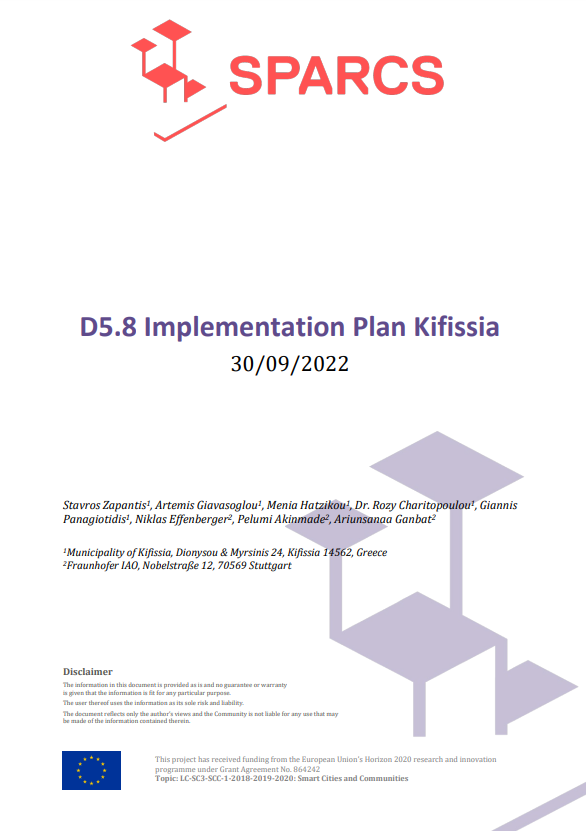D5.08 Implementation Plan Kifissia
SPARCS’s objective is to support European cities in transforming into Sustainable energy Positive & zero cARbon CommunitieS by creating innovative solutions and citizen-centric ecosystems that are equipped to bring about meaningful change. Keys factors of SPARCS solutions include technologies for energy positivity in districts and building, energy storage, e- mobility, flexible grid management as well as stakeholders and citizens engagement.
The current deliverable is part of task 5.3 (Fellow City Replication Strategy), aimed at providing an evidence-based and in-depth understanding for key systems in the SPARCS Fellow Cities–the City of Kifissia specifically, as basis for the development of long-term visions, smart city strategies and of locally adapted interventions regarding positive energy blocks.
The Implementation plan provides a baseline profile of the City of Kifissia and several earlystage project ideas, that are based on interventions in Lighthouse Cities and the packaged solutions. The baseline profile highlights quantifiable sustainability performance of the city, its strengths and weaknesses around carbon transformation.
The methodology followed is the Morgenstadt assessment framework and more specifically its City Lab Methodology for sustainable urban development, based on the qualitative and quantitative analysis of the city of Kifissia.
The profile of the city and its municipal units is outlined, providing valuable information about the environment within which the activities will be implemented. Subsequently, the vision of Kifissia is expressed, which is “to become a carbon neutral city with the use of Renewable Energy Systems, energy efficient buildings; to transform urban areas improving social and economic well-being of the citizens; to establish circular economy and efficient waste management; to use alternative modes of transportation and to establish an environmental mindset with highly engaged citizens.”
To this end, several strategic plans were developed and are summarized in the current deliverable. Specifically, the city’s mobility indicators were analysed, to assist in the development of the mobility sector in Kifissia. Strategic plans regarding energy consumption (provided by the Municipality of Kifissia and other strategic partners) were studied and analysed to form the basis of the city’s profile. Kifissia has also created a sustainable urban mobility plan, which aims to upgrade public spaces and the urban environment, leading to the improvement of the residents’ quality of life. These plans are supported by an information action plan that will disseminate the objectives of the city’s Sustainable Energy Action Plan.
Finally, the on-site assessment was implemented, during which, a total of 29 project ideas were developed, inspired by the implementations in the Lighthouse cities in SPARCS. These project ideas were the result of interviews with representatives from several city departments including deputy mayor of technical department, deputy mayor of environment and recycling and the Mayor of Kifissia. A stakeholders’ workshop and an innovation workshop followed, leading to the selection of six project ideas, including three mobility solutions (bike sharing, municipal e-buses, super blocks), two energy solutions (energy community, energy refurbishment of private houses) and a circular economy solution (waste to energy plant).

